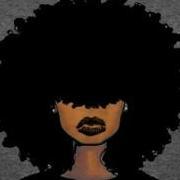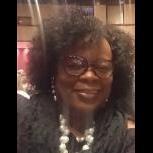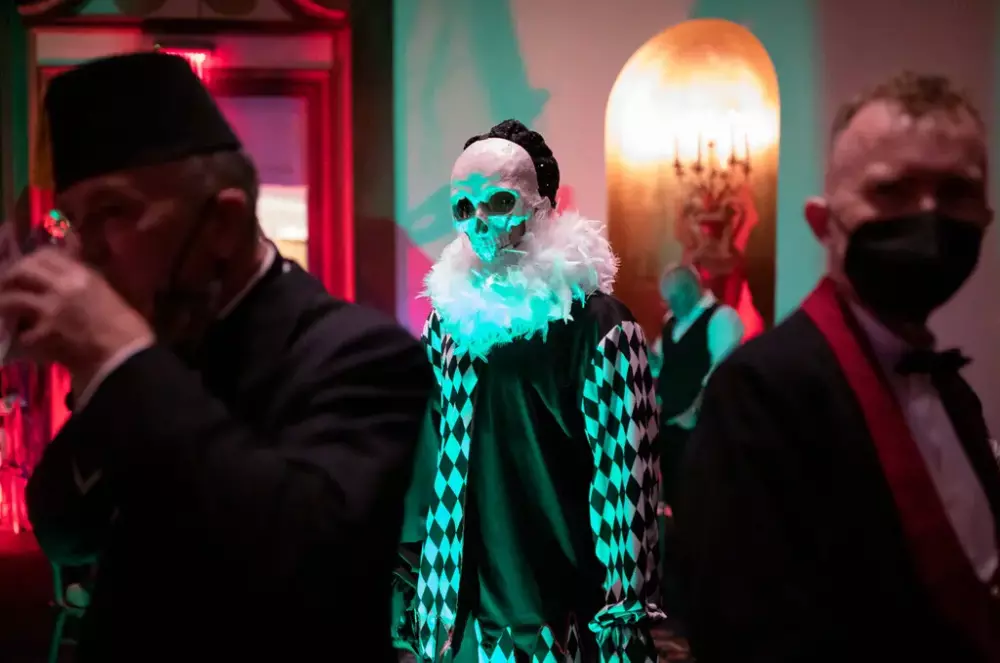-
Posts
3,842 -
Joined
-
Last visited
-
Days Won
120
richardmurray's Achievements
Single Status Update
See all updates by richardmurray
-
A Festival That Conjures the Magic of H.P. Lovecraft and Beyond
At the Rhode Island event, revelers danced to murder ballads and celebrated all things weird. They even found time to reckon with the writer’s racism.
By Elisabeth Vincentelli https://www.evincentelli.comMatt Cosby of NY Times is the photographer
Aug. 28, 2022There’s bacon and eggs, and then there’s bacon and eggs at the Cthulhu Prayer Breakfast. Named after the cosmically malevolent and abundantly tentacled entity dreamed up by Howard Phillips Lovecraft, the event, among the most popular at NecronomiCon Providence 2022, filled a vast hotel ballroom at 8 a.m. on a recent Sunday.
To the delighted worshipers, Cody Goodfellow, here a Most Exalted Hierophant, delivered a sermon that started with growled mentions of “doom-engines, black and red,” “great hammers of the scouring” and so on.
Then the speech took a left turn.
“I must confess myself among those who always trusted that a coven of sexless black-robed liches would change the world for the better,” said Goodfellow, who had flown in from the netherworld known as San Diego, Calif. “But the malignant forces of misplaced morality have regrouped from the backlash that stopped them in the ’80s, and the re-lash is in full swing.”
And so it went, with delicious jabs at incel culture (of which, one might argue, Lovecraft was a proto-member) and plutocrats.
The conference, which took place on Aug. 18-21 in Providence, R.I., for the first time since 2019, is named after Lovecraft’s hometown and another of his literary inventions — a grimoire so dangerous that those who read it meet ghastly ends. (The biannual convention takes place around his birthday; he was born on Aug. 20, 1890.)
The problem is that Lovecraft was a deeply racist and xenophobic man. How we deal with the legacy of a decidedly unsavory person is an issue of great political and cultural relevance nowadays, and the event has tackled it not by retreating or trying to defend the indefensible but by opening up its programming and the range of people invited to participate.
Cordelia Abrams, 49, a Bostonian life coach dressed as an anglerfish at the breakfast, has been attending these events for almost a decade. “This is weird and literary and local,” she said.
Although the event was Lovecraft-centric in its 1990s iteration, it has broadened since a 2013 reboot under the aegis of the nonprofit Lovecraft Arts & Sciences Council and is now subtitled “the international festival of weird fiction, art and academia.” Which, of course, poses the question: What does weird even mean when swaths of the mainstream have a slipping grip on reality? A large number of folks, after all, falsely believe that satanic pedophiles operated out of a pizzeria.
At the “Welcome to the New Weird” panel, the editor and publisher Ann VanderMeer, one of the festival’s guests of honor, posited that “the weird is a way to connect with the world around us and make sense of it.” Most people I met or heard speak over the weekend agreed there was a common element of unease and unsettlement, which explains the panels dedicated to simpatico artists like Clive Barker, David Cronenberg and J.G. Ballard.
What was striking was how many of the participants have worked through the problem of Lovecraft himself to repurpose the basic tropes in his fiction. They are appropriating its overarching themes — the powerlessness of humanity against great, unknowable forces — and turning the weird into an instrument of self-exploration, liberation and creativity.
“What really brought me here is the fact that I love horror,” said Zin E. Rocklyn, a 38-year-old queer Black writer from Florida who was on three panels. “I love the catharsis that it brings, the truth that it brings. An incredible imagination came up with some really shady” garbage, she added, using a stronger word to describe Lovecraft’s views. “It’s based in ignorance and fear, but it taps into a universal fear. Being able to examine that and talk about that and expand on that is a great example of what you can do with such an ignorant business.”
Besides academic papers, the convention offered an abundance of panels sharing a dark sensibility: “Not Just Three Acts: Narrative Structure and the Weird”; “Out of the Shadows: A History of the Queer Weird”; and “The Horizon Is Still Way Beyond You: Zora Neale Hurston’s Life and Legacy.” For the last session, the panelists somehow wrangled an interesting 75 minutes out of Hurston’s and Lovecraft’s irreconcilable differences — contrasting, for example, her searching curiosity about other people with his bigotry.
Among the most eye- and mind-opening panels was the one on body horror, which, for you literary fiction folks, included a reminder that the subgenre encompasses classics like “Frankenstein” and “The Metamorphosis.” That panel felt pointed at a time when control over one’s body is being hotly debated in issues relating to transgender lives and abortion.
Another bracing session dealt with Lovecraft and Southeast Asia, in which the Indonesian-American writer Nadia Bulkin said she loved the idea that Lovecraft’s Great Old Ones (ancient gods as powerful as they are malignant) “are the European invaders trampling on lands that aren’t theirs.” Cassandra Khaw, a Malaysian-born writer and another guest of honor, pointed out an essential distinction between Asian horror movies and their American remakes: The American versions are inferior because they add an element of salvation or moral redemption where there was none.
But many attendees preferred gaming over metaphysical discussions. Several sessions were spread over various tables, mostly on two floors, and ranged from the popular (“Call of Cthulhu,” which is widely credited to have reignited interest in Lovecraft when it came out in 1981) to the willfully obscure (“Hecatomb,” a failed collectible-card game meant to be a dark version of “Magic: The Gathering”) and the hilariously entertaining (“Pirate Borg,” complete with swashbuckling outfits and a screen showing close-ups of the dice rolls).
The volume and variety of the programming was enough to make your head spin like Regan MacNeil’s. There were also film screenings, readings, concerts, live podcasts, walking tours of Lovecraft’s Providence, an art exhibit and theatrical performances. There was even a mushroom jaunt in a nearby park, in tribute to the recurrence of things fungal in Lovecraft’s fiction.
According to Niels Hobbs, the “arch director” of the convention and a marine biologist at the University of Rhode Island (he was on the “Under the Sea: Horrors of the Deep Ocean” panel), this year’s edition drew around 200 guest panelists, artists and reading authors; over 100 volunteer staff members and “minions”; and 1,400 attendees. (Absent from the official proceedings was the pre-eminent Lovecraft expert S.T. Joshi, who later wrote in an email that he had been at NecronomiCon but “kept a low profile.”)
Some preferred focusing on the core mythos, like Brian Vann, 53, a data analyst from Costa Mesa, Calif. “His characters are so frequently warned off: ‘Don’t go there, bad things happen,’” Vann said. “But they go, with terrible results. That speaks a lot to the human condition: How do we just ignore the warnings?”
In comparison to commercial enterprises like Comic Con, Providence had no Hollywood presence and only an infinitesimal amount of cosplay. The one big event that involved dressing up, the Eldritch Ball, had a theme, “Masque of the Red Death,” that freed up the imagination rather than constricted it to trademarked characters — instead of, say, Darth Vader, there was a woman dressed as Persephone, queen of the underworld, and a tuxedoed man in what looked like a green crochet Cthulhu mask. Revelers slow dancing to murder ballads was a sight to behold.
Lovecraft himself might have been surprised to see his work bringing together such an inquisitive, welcoming congregation. But to Goodfellow, 53, the conference is a good antidote to the nihilism ravaging parts of America.
“Instead of rooting for the apocalypse, we’re rooting for sustainability and for people to radically accept each other as who we are and all move forward together,” he said. “It’s a wonderfully ironic backhanded way of finding positivity in absolute negativity.”
Article link
https://www.nytimes.com/2022/08/28/books/necronomicon-providence-hp-lovecraft.html
My Thoughts
I am not a fan of the squid god:) But I never knew of the festival and it seems on reading like what the comic con used to be in NYC, what jazzmobile used to be in harlem, what many festivals used to be that I liked once upon a time.
I oppose the idea that Lovecraft was unsavory. Hitler as leader in the german government did many things that hurt people, whether german or not, ala The romani. But, Hitler had friends. I have never supported Donald Trump's as a real estate man or reality television mogul or president of the united states of america. But I don't know Donald Trump. The white men of european descent who enslaved my forebears , before during or after slavery , I do not like or support or have positive thoughts to. But that doesn't mean they were unsavory. Said white men had friends and loving ones. JK rowlings isn't unsavory. She has positions or viewpoints many do not like, many oppose, many despise, but that doesn't mean she is unsavory. An artist person not fitting a heritage or cultural mold in any community isn't a problem. Their art can still be liked. The problem is communities who confuse liking an art to liking an artist. I don't like the Nazi German party as I am black and by their law I am unfit to live or be treated with positivity if they have control to determine things. But, their night marches are lovely.
The article shows in this convention, the people who attend it were able to do what I have heard or read many artist say they can not do, to Michael JAckson or R Kelly or Bill Cosby or Harvey Weinstein or DW Griffith and that is separate the artists from the art. And that shows a maturity that is rarer or rarer within the consumers or creators of art.








.thumb.jpg.ed52910791d00308abb8c218695bec88.jpg)



